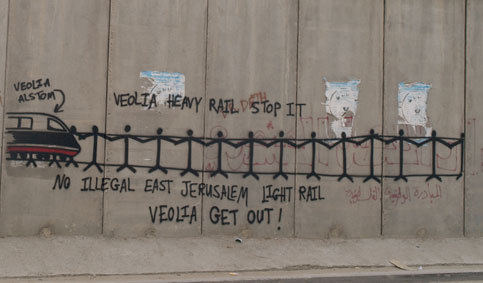AFPS, vendredi 28 août 2015

La nouvelle est confirmée : Transdev, filiale de Veolia environnement et de la Caisse des dépôts, vient de céder toutes ses participations dans le tramway de Jérusalem à des investisseurs israéliens, qu’il s’agisse de sa participation de 5% dans le consortium propriétaire des équipements ou de l’opérateur du tramway, Connex Jérusalem, dont elle était actionnaire à 100%. Ainsi se concrétise le désengagement annoncé de Veolia du marché israélien et des territoires occupés. Il n’y a plus désormais aucune participation française dans cette infrastructure coloniale puisqu’Alstom avait lui-même dû revendre ses 20% de participation dans Citypass en août 2013 à des investisseurs israéliens. C’est un signe significatif de l’isolement international d’Israël auquel conduit la colonisation.
L’AFPS a chèrement payé le combat politique et judiciaire mené depuis 2007 aux côtés de l’OLP contre la participation de Veolia à la colonisation, en particulier avec sa participation au tramway colonial de Jérusalem. Elle apprécie d’autant plus la portée de ce retrait qui constitue une vraie victoire pour l’ensemble du mouvement international Boycott Désinvestissement Sanctions et pour tous ceux, à travers le monde, qui défendent le droit international.
Nous constatons qu’il n’a pas été simple pour Veolia de mener à terme son projet de désengagement de l’ensemble de ses activités du marché israélien. Ce retrait risque de s’avérer fort coûteux pour l’entreprise qui avait fait un bien mauvais choix en investissant dans un projet qui violait le droit international. On l’a vu aussi tout récemment avec Orange, le désengagement, fût-il pour une simple licence de marque, a toujours un coût.
Les entreprises françaises doivent en tirer toutes les leçons. Investir en effet sur un marché où sont massivement violés droits de l’homme et droit international comporte des risques graves tant du point de vue juridique qu’en terme d’image et de communication. Le gouvernement français doit faire passer avec plus de force un message clair aux entreprises : tout investissement qui participe, même indirectement, à la colonisation viole le droit international et les conventions de Genève et doit être proscrit.
Le Bureau national de l’AFPS
English translation below
Israel and the Occupied Territories : Veolia’s withdrawal, an actual victory
The news is now confirmed : Transdev, a subsidiary of Veolia Environnement and of the Caisse des Dépôts, has sold all its shares in the Jerusalem Light Rail to Israeli investors, whether it be its 5% stake in the consortium owning the equipment or the tramway operator, Connex Jerusalem, of which it was 100% shareholder. This makes the announced withdrawal of Veolia from the Israeli market and from the Occupied Territories a reality. There is no longer any French participation in this colonial infrastructure since Alstom itself has had to sell, also to Israeli investors, its 20% stake in Citypass in August 2013. This is a significant sign of the international isolation of Israel to which colonization leads.
The AFPS has paid at great expense its political and legal struggle since 2007, alongside the PLO, against Veolia’s participation in the settlement project, in particular its participation in the colonial Jerusalem Light Rail. It thus even more appreciates the impact of the withdrawal, which is an actual victory for the entire Boycott Divestment Sanctions international movement and for all those who defend international law, worldwide.
We note that it has not been easy for Veolia to complete its withdrawal plan out of all of its activities on the Israeli market. This withdrawal may prove costly for the company, which had made a pretty bad choice by investing in a project that violated international law. As we saw it recently also in the case of Orange, any disengagement, be it for a mere brand license, always has a cost.
French companies must draw all the lessons. Indeed, investing in a market where human rights and international law are massively violated, entails serious risks, both from a legal standpoint and in terms of image and communication. The French government must send more forcefully a clear message to companies : every investment involved, even indirectly, in the colonization violates international law and the Geneva Conventions and it must be banned.

Commentaires récents